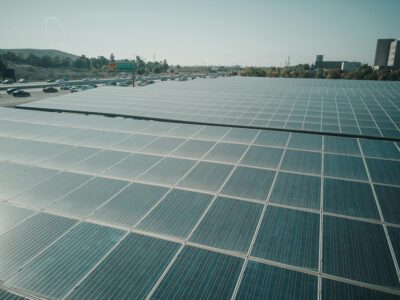Last summer, Ariane Desrosiers and Vincent (Wing Shun) Tang, students in Columbia University’s M.P.A. in Environmental Science and Policy Program (MPA-ESP) at the School of International and Public Affairs, participated in the 2023 Youth Voice Competition for Just Energy Transition. The event, co-sponsored by the International Society for Energy Transition Studies (ISETS) and the United Nations Economic and Social Commission for Asia and the Pacific (UN ESCAP), aims to bring young problem-solvers from around the world together to form innovative solutions for climate change.

Under the name “Team Power Parity Pioneers,” Desrosiers and Tang’s proposal won second place, and they were invited to present in Bangkok, Thailand, last October for the 2023 Youth Voice Dialogue. Below, they reflect on this exciting opportunity and the lessons they’ve carried back home with them.
Why did this competition catch your attention?
Tang: Ariane and I are of similar minds when it comes to the importance of energy and a just transition. Over the summer and fall semesters, we were in the same workshop [a class consisting of a small, faculty-advised project team], which was dealing with House Resolution (H.R.) 891 – Energy Resilient Communities Act. An acquaintance of mine posted about the event on LinkedIn, and we felt like it aligned with our personal interests and what we were currently doing in the workshop, so we signed up. Even though we were really busy over the summer, we made it work. [MPA-ESP students take a full schedule of classes over the summer semester.]
What was your project?
Desrosiers: We created a proposal for climate-resilient energy investment schemes in the Association of Southeast Asian Nations (ASEAN). The project consisted of two parts: a written report and a panel for questions from a group of experts in the field. We came up with a proposal of policy packages for Southeast Asia to transition to renewable energy that consisted of four solutions.
The first solution is to develop a distributed energy infrastructure that can empower communities through a process known as “prosumerism” [where the customers or consumers also take an active role in the production process].
The second solution is to implement transnational power grid revenue-sharing, which can promote equity throughout the region by prioritizing the recovery of countries that might otherwise be economically left behind. [ASEAN is currently working on a transnational power grid to create interconnections between national grids and help facilitate energy trading among its countries. This solution calls for this revenue to be distributed equitably.]
The third solution is to restructure energy subsidies in ASEAN nations by using a mechanism such as a feed-in tariff [a guaranteed payment established for renewable energy investment] to support renewable energy growth. The possible inequities lower-income communities face can be addressed through targeted subsidies like rebates on energy bills.
Finally, the fourth solution is to establish an ASEAN carbon-pricing scheme. By using a standardized emissions trading scheme, firms within ASEAN can optimize their decarbonization strategies.
Once the proposal report was written, we went in front of the panel to answer questions and defend our work. We won second place, which in turn got us invited to the Youth Voice Dialogue in Bangkok.
How did you keep up with your classwork while participating in this event?
Tang: We came up with the proposal over the summer, as it was due in August, and we were able to recover before the conference in October. I had to do a lot of preparation before going so I didn’t have to worry while we were there. I asked my professors if they could post their assignments earlier so I could do them a few days ahead of time.
Did you get any time to explore outside of the event?
Desrosiers: The event was full of panels and discussions that took up the majority of our time there, but we did get to do a tiny bit of sightseeing and get foot massages. We also ate a lot of Thai food!
Were you able to take some of what you learned and apply it to your workshop?
Desrosiers: There is already so much presentation-building within the workshop, that they helped each other. While in Bangkok, we felt validated when participating in discussions on the issues, since most of the other groups’ recommendations were similar to what we proposed.
What did you take away from the experience?
Tang: The energy sector in Asia isn’t a very big circle, so it is important to be able to network and meet different people in the region. It’s also about catching up and keeping in touch with those you have already met. I had an old professor who was able to arrange meetings for us with some people we recognized.
Desrosiers: Since it was co-hosted by the UN, I was able to learn so much about their process for energy decision-making. The entire competition was an energy policy simulation, and that experience itself was great. We were also able to meet and talk to important senior-level people such as Hongpeng Liu, who is the director of the energy division at UN ESCAP.



